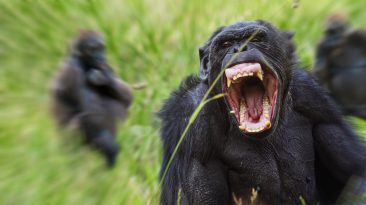It’s got you! Now the powerful jaws of this lizard have clamped down on your flesh and they won’t let go.
You try to pull away, but these little monsters can hold their grip for several minutes. And that’s not even the worst part. Because the whole time that they’re biting you, they’re also doing something else that could send you to the intensive care unit. Or worse.
When a creature has the word “monster” in its name, you’d expect them to be pretty aggressive, but these monsters are actually quite shy. So shy that they spend most of the year in underground burrows. But being underground for so long can build up quite the appetite, so eventually, they come up to the surface to eat. And when they do, they make up for the lost time.
Gila monsters can eat a third of their body weight in a single meal. If you get in their way, you may experience one of the most painful bites in the animal kingdom. The glands behind their teeth produce a neurotoxin. If it gets into your blood, it will cause extreme pain, swelling, and drastic changes in your blood pressure.
And in case that’s not bad enough, there are no antivenoms for this bite. So you’ll need to find another way to survive. How fast can these monsters chase you? Why is trying to shake them off a terrible idea? And how can you pry their jaws open?
Step 1: Don’t pet it
Although they are carnivores, Gila monsters eat eggs, birds, frogs and small mammals, so humans are not on the menu. For a creature that moves at a pace of 1.6 km/h (1 mph), eating us would be no easy task. But when they feel threatened, their powerful jaw muscles can deliver a strong and painful bite. As fascinating and beautiful as this creature is, you should keep your distance if you come across one. And never try to pet it.
Step 2: Don’t shake it off
If you didn’t pay attention to step 1 and the lizard has bitten you, the worst thing you can do is try to shake it off. That will scare the Gila monster even more and make it squeeze harder, wounding you deeper and deeper. And it won’t tire soon, as it can maintain its bite for up to 15 minutes. The pain will be almost unbearable, but you have to stay calm and move on to the next step.
Step 3: Ground it
To calm the animal, you will have to put it on the ground. That will help it feel safer, and it may let go. But if it doesn’t, don’t try to fight it. In July 2001, zoologist Kip Siemens, then 28, was cleaning the cage of a Gila monster named 31 at the Tulsa Zoo when the animal got angry and bit his hand without warning. The excruciating pain caused Kip to try to shake the lizard off, but it only made things worse. The bite became more and more intense. Long, painful minutes passed, but the furious beast wouldn’t give up. Kip had to make a decision.
Step 4: Pry it open
The furious Gila monster biting Kip’s hand had been maintaining its intense grip for about four minutes when he managed to grab a spoon and pried the animal’s mouth open. Kip was free, but his problems were just beginning. The venom began kicking in. He remembers feeling like he was going to faint, tightness in his chest and arms, and tingling in his mouth and throat. His stomach was cramping, and his vision was blurry. That brings us to the next step.
Step 5: Get to a hospital
Yup, there is no Gila monster antivenom. So your best chance of surviving is to get medical attention immediately, as Kip Siemens did. When he got to the hospital, he could not see. Doctors treated Siemens with medication and put him on a ventilator for 10 hours. Fortunately, he survived. After recovering, Kip stated that he will never work with Gila monsters again.
That was a close call. But Gila monsters aren’t the only poisonous lizards. Meet the Komodo dragon. It can run up to speeds of 21 km/h (13 mph), and it once attacked the family of a famous Hollywood actress. Want to know which one?
Sources
- “Gila monsters: Shy but risky” 2021. Azpoison.Com.
- “Gila Monster | Arizona Poison And Drug Information Center“. 2021. Azpoison.Com.
- “Gila Monsters | Poison And Drug Information“. 2021. Bannerhealth.Com.
- “Lizard Bites – Injuries And Poisoning – MSD Manual Consumer Version“. 2021. MSD Manual Consumer Version.
- “Facts About Gila Monsters“. 2017. Livescience.Com.
- “The scariest things in Arizona: Which one freaks you out the most?“.Craven, Scott. 2020.



























